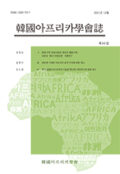| 제목 | 작성일 |
|---|---|
|
한-세네갈 학계, 사하라이남 아프리카 인문학 공동연구
|
2025.06.16 |
|
[학회공지] 한국아프리카학회지 심사비 및 게재료 변경 안내
|
2025.06.16 |
|
[우분투칼럼] '좌초한 카누' 세네갈 젊은층의 목숨 건 유럽행 현장(임기대 / 부산외국어대학교 아프리카연구소장)
|
2025.05.31 |
|
[뉴스칼럼] 아프리카 난민, 우리는 방관자인가 동행자인가(김성수/한양대 유럽아프리카연구소장)
|
2025.05.12 |
|
[뉴스칼럼] 트럼프 2기 대(對) 아프리카 항로와 한국의 길 (김성수 / 유럽아프리카연구소 소장)
|
2025.03.14 |
| 제목 | 작성일 |
|---|
| 제목 | 작성일 |
|---|---|
|
[뉴스칼럼] 사헬지역의 쿠데타 도미노가 남긴 과제
|
2023.10.20 |
|
[뉴스 칼럼] 아프리카의 난민, 그들만의 문제가 아니다
|
2023.07.20 |
|
[뉴스 칼럼] 팬데믹 후 '관광산업 부활' 준비하는 아프리카
|
2023.05.08 |
|
[뉴스 칼럼] 케냐의 약진, 수단·우간다의 후퇴가 뒤섞인 아프리카 민주주의
|
2023.02.08 |
|
[뉴스 칼럼] 아프리카는 '오징어게임'이 아니다
|
2023.01.30 |

